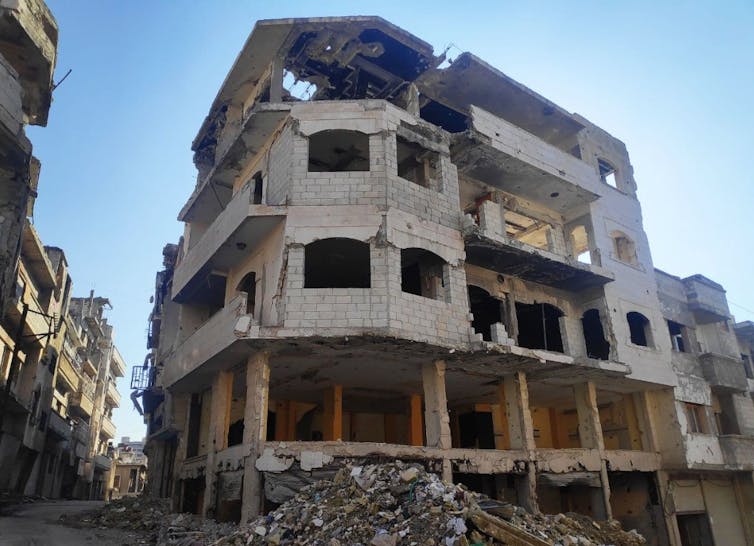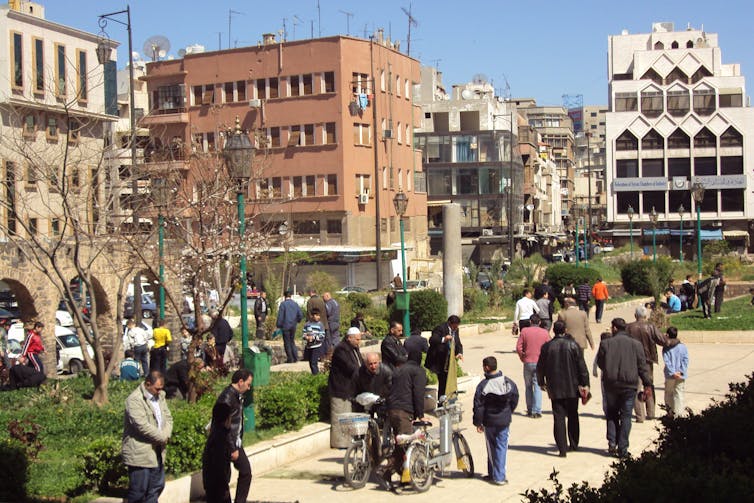‘Every day is war’ – a decade of slow suffering and destruction in Syria

The city of Homs has been ravaged by war, leaving millions of people homeless and displaced.
Abduljalil Achraf, Author provided
Abduljalil sent me a photo of his ruined home in Homs, Syria. “It is the third floor”, he told me over WhatsApp. The building still stands but it looks like an empty skeleton. Most of its facade has been destroyed, while piles of debris surround it. Residents have not been able to return, as they fear it could collapse at any time.
For a decade now, conflict, violence and destruction have reshaped the lives of millions of Syrians since the start of the Syrian Revolution in March 2011. Abduljalil is just one of more than 12 million people who have had to flee their homes. While 5.6 million people have fled Syria to find refuge in countries such as Lebanon, Turkey and Jordan, 6.6 million people have been internally displaced.
Over the past five years, I have been researching the relationship between urban violence and the impact it has on cities. My research has been mainly focused on my home city of Homs where I conducted a series of interviews with local people and examined the way Homs has been transformed in the past decade. The conflict has created a disorientating experience for many Homsis. People have lost some of their most cherished places, as well as many of their loved ones.
I want my research to help people understand how it feels to be forcibly uprooted. What does it mean to see your own country getting destroyed, to see your home – the place that gave you a sense of safety, security, belonging and identity – in ruins?
These questions are personal to me. I too was forced to leave my home in Homs when fighting broke out and tanks entered my city. I have not been able to return since 2011. From afar, I have seen my country crumble into ruins. I have watched the people I love struggle daily, losing their homes, their dreams, their friends and their future. I have lost people – people I coudn’t even say goodbye to.
As a displaced person, my life moves in parallels. Walking in London where I now live, the images of destroyed homes and shattered lives are always at the forefront of my mind. I left Syria, but Syria didn’t leave me. My life, like the lives of millions of us, has been terribly damaged – just like our cities. The past decade has been a story of loss and suffering, a landscape of grief and sorrow.
Homs as it was
Before the conflict started, Homs was known as a city of diversity where different communities from different religious and sectarian backgrounds lived together. It had a population of 800,000 people, but yet there was a strong sense of community – it felt as if everyone knew everyone else.

Ammar Azzouz, Author provided
Many neighbourhoods were divided along sectarian lines. Some were mostly inhabited by Alawites or Sunnis while others were mixed with Alawites, Sunnis and Christians living together.
It was a city of peace, quiet and simplicity. Its people famous for their sense of humour and generosity. The memory of this thriving and cosmopolitan city, makes the present reality even more difficult to swallow.
Abduljalil said the memories of old times haunt his former home like a ghost. He said:
I remember the stars I put on the roof in my bedroom … but even the stars fell.
Abduljalil and his family had no choice but to flee their home in 2013 fearing, for their lives. Their neighbourhood, Jouret al-Shayah, at the heart of Homs, was heavily targeted.
Other cities including Mosul, Beirut, Aleppo and Raqqa have suffered too. Cities have turned into battlefields. Wars are no longer fought outside densely populated areas, but in neighbourhoods. The urbanisation of the military has made everyday life a target.
Even cultural heritage sites have been targeted. The shelling of places such as the Khaled Ibn al Walid Mosque in Homs, the destruction of monuments, cultural artefacts and temples in Palmyra and in the Ancient City of Aleppo shocked the world.
But this interest in the ancient monuments has overshadowed the loss people have endured to their way of living that has collapsed in the past decade – the slow suffering. Homes, bakeries, schools and hospitals have been destroyed too. But these “ordinary” spaces have rarely been brought into the conversation.
Everyday life is a battle for survival, even though the fighting in Homs has ended. For many families, food – including sugar and bread – are becoming hard to obtain. Some of the people I spoke to reported long hours waiting to get rice, while many struggle to afford food due to the country’s economic collapse. The UN has reported that around 60% of Syrians (12.4 million people) do not have regular access to safe and nutritious food.
One woman I spoke to, who asked not to be identified, lives in Mashta Al Hilu, a town between Homs and Tartus. After finishing her degree in architecture in Homs, she struggled to find a job. She told me how she felt when walking in the ruined streets. In Baba Amr she said she felt as if a “monster” had destroyed it.
Her dream is to improve her violin skills, but these dreams are on hold. She said she felt isolated, as many of her friends had left Syria or had been killed. She asked me:
Is life after war more difficult than the life at the time of war? … Every day is war.
There were hopes for change in 2011. People imagined that the future would be different. Nobody expected that Homs would be destroyed, that entire neighbourhoods would be razed to the ground, that another day could mean yet another loss.
Abduljalil and his family couldn’t rebuild their home. No charity or organisation helped them. They eventually decided to sell the ruins and rent outside the heart of the city. Abduljalil still visits his past life, his lost home. He told me: “I feel as a flower uprooted from its roots and planted in another place”.
Ammar Azzouz, Short-term Research Associate, University of Oxford
This article is republished from The Conversation under a Creative Commons license. Read the original article.


















